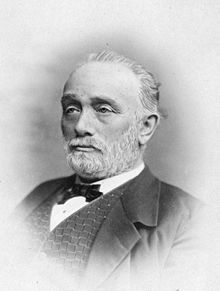Ludwig Büchner
| Ludwig Büchner | |
|---|---|
 |
|
| Born |
29 March 1824 Darmstadt, Grand Duchy of Hesse, German Confederation |
| Died | 1 May 1899 (aged 75) Darmstadt, Grand Duchy of Hesse, German Empire |
| Nationality | German |
| Alma mater |
University of Giessen University of Strasbourg University of Würzburg University of Vienna |
| Era | 19th century philosophy |
| Region | Western Philosophy |
| School | Continental materialism |
|
Main interests
|
Philosophy of science |
Friedrich Karl Christian Ludwig Büchner (29 March 1824 – 1 May 1899) was a German philosopher, physiologist and physician who became one of the exponents of 19th century scientific materialism.
Büchner was born at Darmstadt on 29 March 1824. From 1842 to 1848 he studied physics, chemistry, botany, mineralogy, philosophy and medicine at the University of Giessen, where he graduated in 1848 with a dissertation entitled Beiträge zur Hall'schen Lehre von einem excitomotorischen Nervensystem (Contributions to the Hallerian Theory of an Excitomotor Nervous System). Afterwards, he continued his studies at the University of Strasbourg, the University of Würzburg (where he studied pathology with the great Rudolf Virchow) and the University of Vienna. In 1852 he became lecturer in medicine at the University of Tübingen, where he published his magnum opus Kraft und Stoff: Empirisch-naturphilosophische Studien (Force and Matter: Empiricophilosophical Studies, 1855). In this work, the product, according to Lange, of a fanatical enthusiasm for humanity, he sought to demonstrate the indestructibility of matter, and the finality of physical force. The extreme materialism of this work caused so much opposition that he was compelled to give up his post at Tübingen, and he retired to Darmstadt, where he practiced as a physician and contributed regularly to pathological and physiological magazines.
...
Wikipedia
